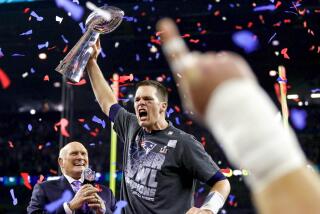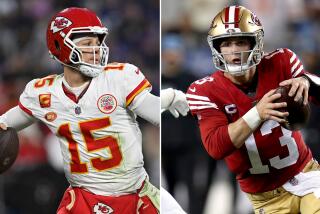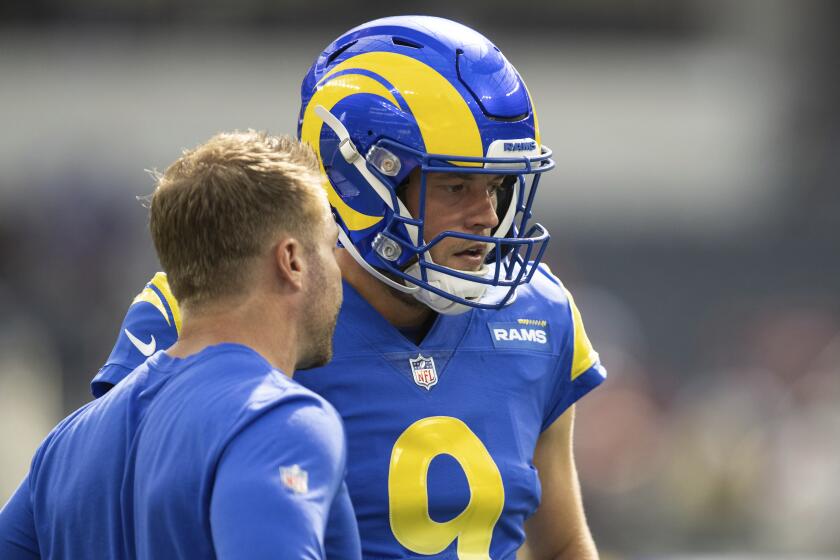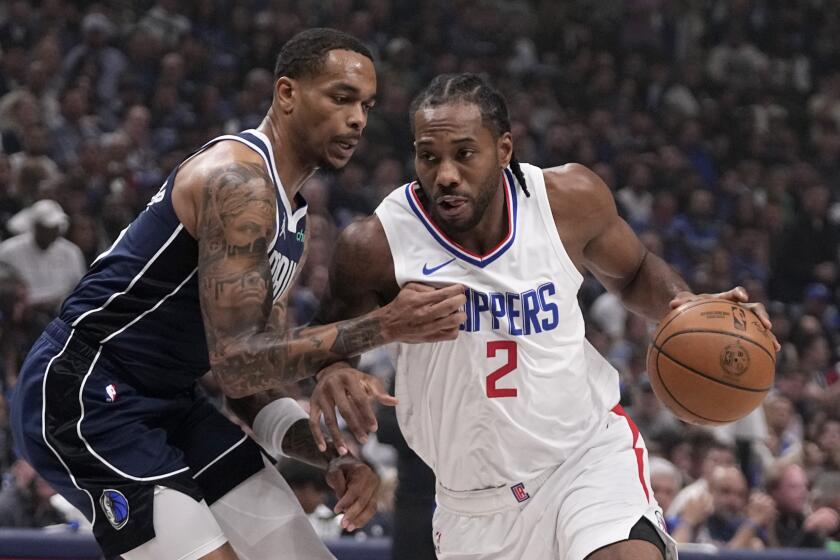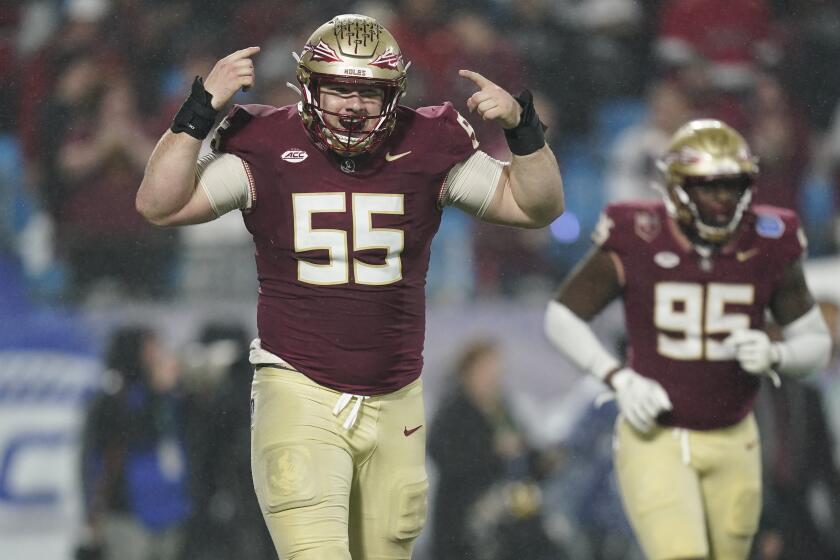The high price of heroism in pro football
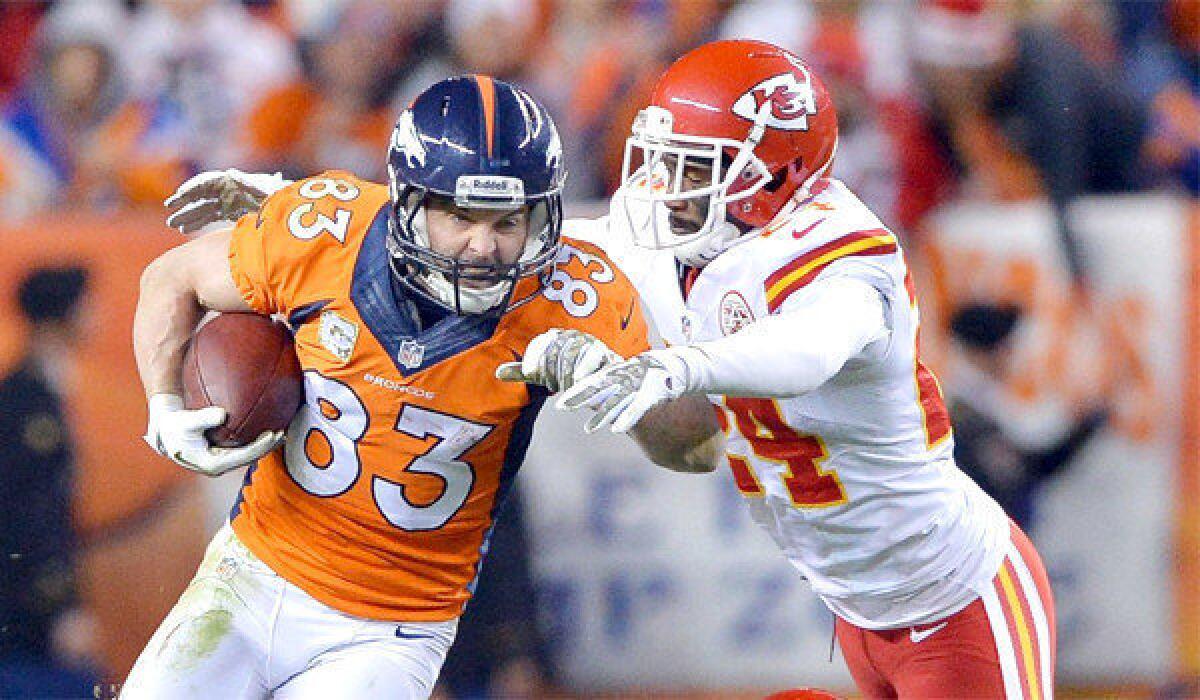
The big story in the NFL this weekend is Peyton Manning versus Tom Brady. Or is it?
The matchup of two of the premier quarterbacks in the history of the game, the Denver Broncos’ Manning and the New England Patriots’ Brady, is where the NFL wants our goose bumps.
There is no denying the attraction.
Both teams are very good. Manning is chasing Brady’s single-season touchdown passing record of 50. The game is in the prime-time Sunday night spot, where the best in the business, Al Michaels and Cris Collinsworth, broadcast and analyze the action.
Last week’s matchup between unbeaten Kansas City and one-loss Denver drew the largest TV audience for a prime-time game in November in 17 years, an audience of 26.9 million people on NBC.
There is no reason to believe that number won’t be topped again. Factor in Boston’s TV market versus Kansas City’s and you can see the possibilities.
But here’s hoping another story — less sexy than Manning-Brady but possibly more significant — doesn’t get lost in the shuffle.
That is the story of Wes Welker.
And no, we are not talking about his return as a Bronco to play against a Patriots team for which he became a fixture and an All-Pro in his six seasons in New England. We are talking about how, perhaps, he shouldn’t make the return at all, and about how the macho nature of the NFL may very well influence a bad decision.
Welker is 32 years old. He is 5 feet 9 and is listed at 190 pounds, which, if similar to many NFL team listings, is about a 10-pound exaggeration.
Despite his size, he is a great player, a mighty mouse in a world of big cats. He already has 61 catches for 648 yards and nine touchdowns for the Broncos.
On Sunday, against the Chiefs, he made a catch with about 10 minutes left in the game and was crunched from behind and the front in a violent tackle. He was down for a while and quickly surrounded by the concussion scrum we are getting so used to seeing in the NFL, which pretty much ignored concussions for years and now swarms on them like ambulance-chasing lawyers.
There was the circle of trainers and medical personnel, looking closely for the danger signs of a concussed player.
Welker apparently passed those tests, because nobody took his helmet away when he went to the sideline. In a few minutes, he was back in the game, even catching a pass.
But then, he was quickly back out and done for the night. The diagnosis was announced the next day. Concussion.
Now, any concern about what a potentially dangerous mistake had been made by allowing him back in the game has been overshadowed by the rush to get him back to face the Patriots.
On Thursday, the Broncos closed practice, but media sleuths learned that Welker was at practice and participating. He reportedly had been going through a battery of tests to determine his fitness, but everybody seemed to assume he would play Sunday, even though, in most medical arenas, a concussed person isn’t ready to reenter a violent arena such as the NFL as soon as one week later.
One report Friday had Welker cleared to play, but with concussions things can change rapidly. The peer pressure, all of it well-meaning and less than enlightened, has been heavy. If you are Welker, you are reading quotes such as this:
Interim Coach Jack Del Rio: “He’s just so competitive. I’m sure he is looking forward to playing with us and against his former teammates.”
Manning: “I think Wes would want to be out there for the fourth preseason game if the team would let him.”
Even Brady: “He’s a tough guy. He’s played through everything.”
If Welker has a headache, it will just get worse reading those things and knowing that, if he doesn’t play, he comes off like a wimp. Of course he wants to play. Of course, he probably shouldn’t.
The one-week return has recent precedence. The 49ers got Eric Reid and Vernon Davis back on the field one game after concussions. That won’t be lost on Welker, nor on the Broncos’ doctors.
The NFL deserves credit for trying, even though it is about 30 years too late for many of its former players, and even though failure to admit its longtime head-injury problem will eventually cost it billions. Now it has programs and procedures in place, and its medical personnel seem to be trying hard. The days of holding up three fingers for an injured player and letting him go back in if his answer was within two are over.
But still, something slipped through the cracks when Welker was allowed to reenter the game.
All concussions are not created equal. Welker’s may show enough improvement to legitimately allow him back out there in one week. He could even become a hero in the game, taking his usual beating, but also leading the way in beating a team that was once his until it turned its back on him in contract dealings and let him go elsewhere.
It’s always funny — sad funny — how these things take care of themselves.
In 20 years, when Welker is telling people, as Brett Favre did recently, that he is having trouble remembering things, all we will remember about the Nov. 24, 2013, Broncos-Patriots game was that Wes Welker was a hero.
More to Read
Get our high school sports newsletter
Prep Rally is devoted to the SoCal high school sports experience, bringing you scores, stories and a behind-the-scenes look at what makes prep sports so popular.
You may occasionally receive promotional content from the Los Angeles Times.
